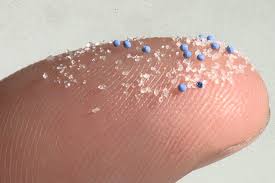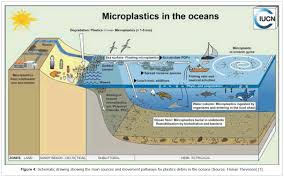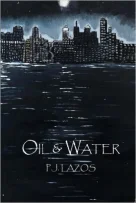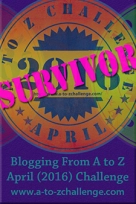I Just Want to Say One Word to You…
Imagine sitting on a beach. It’s hot. You’re thirsty. So you pull one of those handy plastic bottles from your cooler, take a big swig and are instantly refreshed. Or maybe it’s been a long day and you’re on your way to meet your mates and hoist a few hefeweizen. Or your just got up and put the water on for coffee or tea. Then you eat, rinse the breakfast dishes, stick them in the dishwasher, take a shower, wash your hair, brush your teeth, maybe throw in a load of laundry and head off to work. (This is all assuming that you’re not one of the 2 billion people who don’t have access to clean water.)
What if I told you that with every one of those hydro-centric actions, you were also drinking or washing with plastic? That your tea, coffee, water, soda, beer, or other beverage of choice contains tiny bits of plastic so small you need a microscope to see them. That the water you shower or clean your clothes with is also awash in plastic. Well, first you’d call me a liar and then, when you read the data you’d be indignant, and finally, resigned and looking for a way to make sure it didn’t affect you personally by buying a water purification system or maybe moving to New Zealand.
Well, a water purification system probably won’t work and even if it did, it’s not going to help you control the 59 million other places you use or come into contact with water. The ubiquitous and handy little item that we call plastic has infiltrated our lifestyle so succinctly that it might someday be part of the human genome. Okay, maybe I’m exaggerating a teensy bit, but not when it comes to water. Recent studies have shown that plastic fibers were found in over 83% of tap water samples taken from at least a dozen countries around the world with the U.S. coming in first (“Make America Great Again!”) at a whopping 94% contamination rate. If you think that plastic is not an equal opportunity polluter then hear this — samples were taken at such erudite and lofty sites as Congressional buildings, the U.S. EPA headquarters, and the Trump Tower in New York City. Europe, bless their little recycling hearts only averaged plastic fiber contamination in 72% of the samples, but it’s hard to call that a win.
Plastic has not been found in just tap water. A small study in Ireland also found plastics in some well water samples, and natural springs in Beirut, Lebanon were at a 94% contamination rate. Remember all the hubbub about microbeads and plastic islands floating around the ocean? Well, it’s not just water and marine life that’s being affected by plastic, but also wildlife. As human beings occupy the highest rung on the bioaccumulation chain, it’s really only a matter of time until those nasty little fibers have entered our bodies as well, invading cell walls and generally creating chaos.
Microplastics are in fish, and honey, and the ambient air and seemingly everywhere we turn. Our clothes have plastics woven into them to make them last longer, wear better, keep us warmer, velcro us together, and there’s no denying that these have been terrific advances for humans because no one wants to go mountain climbing in wet wool when there’s Gore-Tex, but at what cost has it come?
One study suggested that 700,000 micro fibers were released with each load of laundry while another suggested that since the 1950’s, 8.3 billion tons of plastic have been produced with very little recycling to offset it. A staggering 91% of plastic is not recycled, a sobering statistic when we’re cranking out one million plastic bottles a minute and if you add that to all the car parts and phone parts and computer chips and circuitry and milk jugs and orange juice containers and fleece jackets and kites and car tires and all the other things we make, plastic accounts for half of all human waste.
Almost three decades ago when I was in law school and Editor-in-Chief of the Environmental Law and Technology Journal at Temple University, I wrote a paper entitled, “I Just Want to Say One Word to You … Plastics.” If you’re a movie buff, you know that it’s a line from the movie, “The Graduate,” (1967 – directed by Mike Nichols, starring Dustin Hoffman, Anne Bancroft, and Katherine Ross) about a young college graduate who begins an affair with an older woman and later falls in love with her daughter. The line is from a scene at Ben’s (Dustin Hoffman) graduation party where everyone seems to want to give him advice on how to be an adult. I used it as the title of my paper because that period of time marked the beginning of the burgeoning plastics industry and simultaneously the recklessness and throw away attitude with which we began to view the natural world. The paper called for a federal plastics recycling law which I felt was necessary to give a uniform structure to the process. With plastics recycling, unless you know where the product came from, you have limited ability to do something with it in the future. For example, a plastic container that once held kitty litter cannot in its reincarnated state become a milk jug. To my mind, a federal recycling law that required coding on all plastics made in the country would go a long way toward helping the nascent recycling business take hold.
Without making a long story even longer, the paper never got published. The next editorial board couldn’t figure out where it fit in the journal’s publication since it wasn’t hard core science, discussing the manufacturing of plastics recycling, and it wasn’t hard core legal, citing lots of case law and arguments for and against mainly (because the case law was tangential or non-existent). At the time, recycling was in its toddler years, and the problem of plastic waste was not in the forefront of people’s minds. The paper was basically a call for more regulation, something no one is ever keen on, and by that time it got nixed, I had already been graduated and accepted a job happily protecting human health and the environment so while I was saddened by the reality that no one would read my brilliant treatise on why we needed a federal recycling law, I let it go.
[photo taken at the HAAC 2017 Sustainability conference]
Fast forward twenty-eight years later — we still don’t have a federal recycling law and we are literally awash in plastic. One thing is certain. Money is needed to conduct additional research as the preliminary studies are just the wart on the witches nose. Sources and pathways to ingestion — mouth, skin, lungs — need to be studied and waste water treatment standards and technology need to be improved. AND, we all need to cut down on our use. Buy a stainless steel water bottle, store food in glass containers, don’t buy throwaway items made of cheap plastic like straws and other one-time use items. All these are good places to start. Otherwise, sometime in the future, we won’t be able to tell the humans from the artificially intelligent beings, and where will that leave humanity besides swimming in plastic?
pjlazos 3.25.18
p.s. How about the answer to the question of how many plastic bags the average American uses each year? 335!
















The situation you describe makes me think the measures I take are futile. But second thoughts made me resolve to try harder and that includes spreading the word. We can all do more. Thanks for your part in making positive change.
LikeLiked by 1 person
Nothing is futile, Robyn. Small changes widely adopted make big impacts.😘
LikeLiked by 1 person
We must all keep these wise words in mind.
LikeLiked by 1 person
❤️🙏❤️
LikeLiked by 1 person
Pam, this is horrifying!
LikeLiked by 1 person
I know, I’m sorry, Robyn!😩
LikeLike
I did knew about how consuming food stored in plastic is dangerous. I’ve given up on using plastics, as far as I can. But reading that it is also present in the water makes me worried. You’re knowledge, research and experience speaks through this post. Definitely everyone should know this and avoid plastic in every possible way. Thanks for sharing.
LikeLiked by 3 people
Thanks for reading and yes, we need to be educated more about plastics and the danger to our health.
LikeLiked by 2 people
True 😊
LikeLiked by 2 people
I need to get my sewing machine out and sew my own grocery bags! ❤
LikeLiked by 4 people
Haha. Awesome, Colleen!😘
LikeLiked by 1 person
I do take my bags when I go to Costco. LOL! 😀
LikeLiked by 1 person
👍👍👍
LikeLiked by 1 person
This is an excellent post, Pam. I am pleased to see Susan over hear and read her comments from an African perspective. Sharing this.
LikeLiked by 2 people
Thanks, Robbie!😘🙏
LikeLiked by 1 person
Yikes!
Wagnificent bark out!
3 bum swings! 3 more!💜
Nose nudges,
CEO Olivia
LikeLiked by 2 people
😉
LikeLike
Very informative Pam! We’ve got to change our ways, and I need to make better choices too. I always think that if I take the plastic bags back to the store for recycling and recycle my plastic that I’m doing the right thing, but I guess not. What a difference if manufacturers would go back to using glass containers for our food, and maybe we could come up with something made out of cornstarch or something that would breakdown in a year for non food items. Some plant pots are like that. I’m going to start using my cloth bags from now on.
LikeLiked by 3 people
Way to go, Michele!
LikeLike
Ugh, this use and toss philosophy needs to be deleted from the commercial sector somehow. The boys just watched WALL-E today. My daughter doesn’t like it when I say how our world could look like that if we’re not careful…
LikeLiked by 3 people
I loved WALL-E although it was pretty dystopian. I think the future can be scary for kids esp with so many things going extinct and the world out of balance.
LikeLiked by 1 person
I saw this article on a friend’s Facebook page today and thought of this post … now, how sad is this?
https://www.cnn.com/2018/04/11/health/sperm-whale-plastic-waste-trnd/index.html
LikeLiked by 3 people
This is terrible. :0(
LikeLike
What this made me think of is how we’ve further contaminated our water by drinking more and more bottled water, something that we’ve done thinking we would be getting purer water.
LikeLiked by 4 people
Yep and instead we now have billions of bottles of waste. 😩
LikeLike
Hi PJ – I’ve known about plastic for a number of years … and try not to use it – but like many of us – the ease of it just slips by … I’m horrified how much plastic is in clothes etc … in fact there’s so much more to this problem – thanks for reminding us though.
Also good to read Susan’s note re the water drought in the Cape … I’d needed to see what the situation was …
excellent post – cheers Hilary
LikeLiked by 4 people
Hi Hilary! It’s even more alarming because, as you say, the volume and so much is hidden. Who would have guessed your clothes leach plastic when you wash them.
Yes, Capetown dodged a bullet.👍
LikeLike
Thanks PJ – so much plastic is just about everything we use and buy .. I hope the plastic guzzling bug in Japan will help; however re Cape Town it hasn’t rained yet – Susan when she’s in the Cape is much further east … it ‘might’ rain a bit in CT this week – cheers on Earth Day – Hilary
LikeLiked by 1 person
Happy Earth Day back to you, Ms. Hilary!
LikeLiked by 1 person
That picture is worth a thousand words. Wow!
LikeLiked by 4 people
😂😂😂
LikeLiked by 1 person
😂
LikeLiked by 3 people
Pingback: I Just Want to Say One Word to You… – Wag 'n Bietjie
Thanks for the reblog!😘
LikeLiked by 1 person
Thank you for stopping at my blog and following. I came here to follow you as well. It is a harsh reality what we are doing to our world and we have to stop and think about it more than one day a year on “Earth Day” … one day a year will not cure our ills that we have created for our environment. I had heard about the sediment in the plastic – pretty horrifying, just as horrifying as to drinking bottled water and knowing the plastic leaches into the very water that we drink so we don’t resort to drinking plain old tap water. The bottle caps on pop and bottled water cause litter on beaches or playgrounds and animals swallow them or get the plastic rings on some packaging caught onto their mouths suffocating them. Nothing is safe in our modern world. Even the sea salt that is sprinkled on crackers like Triscuits that you believe you are eating healthy as it is sea salt, contains minute particles that are harmful to you.
LikeLiked by 5 people
So true. We have to demand more from our manufacturers and ourselves.😩
LikeLiked by 1 person
That’s the truth … one day a year, on Earth Day, we stop and take a hard look at ourselves, then go back to our regular ways again.
LikeLiked by 3 people
😩
LikeLike
Pam, Well done highlighting The horror of out plastic comsumption!
LikeLiked by 4 people
Thank you, Paul. 😘
LikeLiked by 1 person
Very informative article, Pam! Why can’t all states follow Californias lead? I throughly enjoy your blog, it makes me more aware of issues that otherwise aren’t on my radar. shttps://www.google.com/amp/s/www.mercurynews.com/2017/11/13/editorial-success-californias-first-in-the-nation-plastic-bag-ban-works/amp/
LikeLiked by 3 people
Thank you, Victoria. That was a very kind thing to say. I don’t get the human fondness for waiting until we are on the brink of disaster to fix things. California is a leader. Too bad this administration doesn’t recognize it.
Also somewhere on this blog I did a post about San Francisco’s ban of plastic bottles. We should all be so forward thinking. 🤔
LikeLike
Great post, Pam. I wondered if you had seen the plastics in tap water report. I didn’t share because a person can only stand so much negative news. great writing style! gayle
LikeLiked by 4 people
Oh my gosh, Gayle, I know! And they haven’t even scratched the surface yet about the extent of plastics in various resources and if you account for all the plastic we ingest through bioaccumulation, it’s not a pretty picture.😩
LikeLiked by 1 person
This is so important. Thanks for writing about it.
LikeLiked by 4 people
Thank you for dropping by.🧐
LikeLike
Pretty scary – are we waking up to this reality and doing what we can to minimize our use of plastic? No to straws – paper bags for produce bought from shops etc. there’s much that each person can do. Take away coffee mugs -take your own. And recycle as much as possible. Thanks Pam –
LikeLiked by 5 people
I don’t think anyone realized the extent of the micro plastic problem until recently, Susan. And guess what else is made up of water? The human body! So we all could have micro plastics coursing throughout our bodies.😳😩 Maybe not too late but sure getting late in the day, eh?😔 How’s the water situation there? Do you have rain? ☔️ As always, thanks for stopping by.
LikeLike
Yup – scary. Microbeads also in facial scrubs and lotions etc … late in the day for sure. Nappies, zillions of them, coffee pod containers, the list is endless. Things that do not break down or take one hell of a long time too, time we don’t have …Up here on the highveld where I live, we don’t have a water problem and have had some nice summer rains, but we are also water-wise. Down in the Cape – thank you for asking – the rains are due but they are still in drought conditions …
LikeLiked by 3 people
Disaster avoided another day.😉
LikeLike
I must interject, Susan, and say that it is only those who have and who can afford to care that are making such efforts. The bulk of our population just survive and will take anything that comes there way to make life easier. I have noticed that everyone uses disposal nappies now, regardless of economic status.
LikeLiked by 4 people
There’s definitely an economic aspect to it all. Roughly one-third of the world’s population doesn’t have access to clean water. 😩 That speaks volumes.
LikeLiked by 2 people
Hi Robbie, even the poorest of poor use disposable nappies. They’re also very expensive. They were available when my kids were little, but I liked to wash them in that Milton’s steri stuff, in a bucket, and hang them out to dry. Maybe it helped that I had help 🙂 There were times though that I used them eg when travelling but I used to wonder then about their filling up landfills –
LikeLiked by 3 people
Now it’s tampons and plastic bottles.🙄
LikeLike